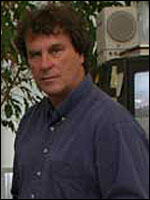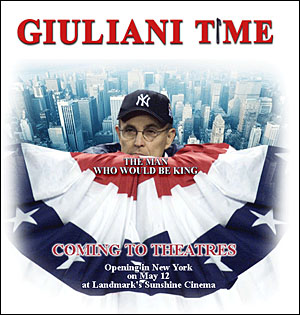Kevin Keating
Kevin Keating's extensive experience as a Director of Photography spans over 25 years and covers the full range of filmmaking from features, broadcast news and television specials, to educational, industrial projects and many documentaries. Beginning in the early 1970s, his passion for political filmmaking led him to work closely with the Maysles brothers and Barbara Kopple among others. He was also a staff cinematographer for WNET's "The 51st State" and went on to shoot parts of the Maysles' "Gimme Shelter" and Leon Gast and Jerry Garcia's "The Grateful Dead Movie." He also filmed Mohammed Ali in Zaire and Manila for what would become parts of "When We Were Kings" (Leon Gast 1996), more than two decades later.
In addition to When We Were Kings, Kevin's other Academy Award credits include Harlan County, USA (Barbara Kopple 1977), American Dream (Barbara Kopple, 1992) and the Academy Award nominated Liberators (Nina Rosenblum/ William Miles 1993). Other credits include "On Company Business", a four hour documentary about the CIA which aired on PBS; "No Holds Barred", a CBS-TV special; Wyeth at Kuerner's; and "Hells Angels Forever", a theatrically-released documentary that he co-directed. He began K Video Productions in 1994 and has since worked on a variety of projects: from music and educational videos to feature film screenplays and, of course, documentaries. "Giuliani Time" represents Kevin's debut as a director of a major feature documentary.

A Time For Everything!
The ONLY way to describe Kevin Keating is passionate. It is what I appreciate so much about him. I look forward to my talks with Kevin because his energy and enthusiasm are infectious.
It has been a privilege to know Kevin Keating and to talk with him regularly about the progress of his latest project, partly because he has put everything into it without guarantee that he will get anything back in return. And partly because -
I look forward to having the opportunity to say:
"I remember him when!"
____________________________________________________________
As told to Dana:
My life is largely shaped and driven by my work. I think maybe a bit too much. It is all consuming. I am fortunate. My work is driven by my awareness of my surrounding - political awareness; of what is happening in my, in our society. Essentially the separation between work and existence are not much. When I leave work, I don't stop thinking about what it is that I am doing. I am lucky. What I enjoy most is what I do at work. Maybe I am unlucky because there isn't much of a distinction between work and life.
My work is what I love.
It is significant, to me, how we come to do what he does, in the way that we do it.
I did not go to law school. Instead, I went into film making right out of college because of my politics; being shaped by a struggle against the war in Viet Nam. That emersion and being pulled into that struggle was unusual.
I came up from a working class family with, essentially Republican and "right wing" leanings. I found myself in contradiction with our society because of the war in Viet Nam. That ended up being instrumental in shaping my, what I hope is,
a sophisticated political philosophy.
And that is also part of what I came to do, which is make documentary films; a particular kind of documentary films.
What drives us as human beings is very often complex. Why do we go after what we go after? How and why did we end up where we are now?
My life is driven by what happens in my work and vice versa. When I am not working I am reading about stuff that relates to work. There is a great deal of satisfaction that comes from the quest to discover both information and develop naturally what is a political philosophy or a philosophy of life. Life and work are intermingled. They don't really separate for me.
When I am not working on Giuliani Time, this film, for instance, I am studying the political environment and trying to make social change. This is what I learned to do with my colleagues and I have been doing it for a long time. It has never waned.
It was always clear that that is what I was supposed to do!

GIULIANI TIME: Synopsis
Kevin Keating’s chilling documentary examines Giuliani’s rise to power, his policies and his so-called turnaround of New York City. Interviewing journalists, activists, legal experts, and many of the city’s poor, “Giuliani Time” reveals that while the Mayor touted his Broken Windows, Quality of Life and Zero Tolerance policies, the reality on the streets was police brutality, violations of the First Amendment and racist actions.
Then 9/11 happened and Giuliani’s actions endeared him forever to Americans. Should we allow that to overshadow the darker moments of his administration?
Visit the Giuliani Time Website: http://www.giulianitime.com/
To join the Giuliani Time Yahoo!Group,
click here
It is the same with elders who struggled in the Civil Rights struggle or the great labor leaders who struggled for labor rights. It is a natural thing. You embed yourself in a sea of ideas and social struggle and that becomes your essence and it's great!
It's a wonderful thing to be able to say that, 35 years later, that wasn't such a bad choice -- That was a pretty good choice.
And success? It something that we all must define for ourselves so that we can, hopefully, live with ourselves.
It would be great to think that the films that we make will get to a large audience. Often times they don't because these are politically focused on being instruments for social change; weapons in a cultural war.
Look I am bankrupt. I haven't got a dime. Everything went into this. My marriage dissolved; disintegrated. I have no idea what is going to happen next. But I know that Giuliani Time was in the A-1 section of The New York Times political report on Giuliani's run for the Presidency. That's pretty good. "It's a problem for Giuliani."
Whether we agree or disagree, the opinions of a passionate person, someone who has taken a stand for and put their life on the line for something bigger than themselves - that is inspiring.
Listen, maybe we do a little nano-second of "save the nation" and for a moment Giuliani has a problem. I don't think that it is a good thing that Giuliani is prepping himself for a run for the Presidency. I don't think that is good for the nation or the world. I don't think that is good. If our effort -- five years of concentrated-to-the-grindstone effort -- ends up as a coherent instrument for slowing that process or being an obstacle for Giuliani and the reactionaries coming in to pick up the debris from this Bush debacle, if we impede that, that is why we made the film.
Late at night, when it's just you and you, and you ask yourself "Was it all worth it...?"
Of course it is worth it. Whatever happens, it's already worth it.
And, it wasn't realizing "the dream". The dream wasn't to have a great film about Giuliani. The expectation was to bring to bear all of the skills that one has to make something that is important, historical, coherent; something that has impact. My co-producer William Cole put his life into this and the editor Peter Tooke and everybody who just willfully gave to come up with this effort, this group and our labor has produced this documentary. That has been a wonderful sense of --
realizing something.
My particular objective was to present honest, historically accurate...It is a broad, deep, comprehensive, complicated, "many-issued" compilation. Not that it is irrefutable but it does enter the political dialogue. The questions that are raised in the film, on many levels, from personality to policy, are questions that have to be addressed.
So, from now on, let it be said that:
"No one goes into the 'Giuliani for President' arena without having absorbed this film".
There is something to be said about doing it on your terms; doing it your way - no regrets.
If my life would have been altered in any way as a result of not making this film, in any way, I wouldn't have changed anything.
Although,
It's sad...to think...(sigh)...because it cost me my marriage.
But,
I wouldn't change anything. I am satisfied that we realized the whole objective of making a powerful historical document.
Sacrifice is the word that comes to mind for me. Sacrifice. I begin to imagine the many sacrifices that great people have made in the past to leave something behind of value for others.
Paul Robeson sacrificed everything. I don't think that I sacrificed anything. I am O.K. I went to the gym this morning. I still have my children. And, I have the great satisfaction of having finished the film and --
the payback is coming.
So far it has been good. So far...
No sacrifice?
I don't measure success in terms of accumulating wealth. I think I am very happy because I think that is what you do. You make film or theater or poetry that blows against the empire... and I think that it is probably already in you so, there is no choice.
What? Are you going to take a job at an advertising agency? Become one of these schmucks that make commercials for $25,000 a day and inure themselves to American Express? Fuck that! Fuck them! I never did it. Never would. I am glad I didn't, wouldn't, couldn't have.
I am very lucky. I was able to get to this point. Not like Giuliani - he is my anti-thesis.
The struggles have been many - mostly internal. They almost always are.
It's always about not being enough. Not being sharp enough, not being schooled enough, not being -- what? Not being clear enough or objective enough.
I am inspired by the notion that we did do it. We did! We finished it and it is good. It is a really powerful film. No one is coming away from this film unsatisfied. I put everything into it.
Why? Why do we do what we do? Why do we put ourselves out there, sacrifice and risk, sometimes, everything?
This film has been my biggest contribution; an historical contribution.
This film is going to last and be around for a long time. I think that I will be remembered for this film and that wouldn't be bad.
This is the little film that could. We just chugged along and chugged along, while all of the other shit was going on. We went bankrupt but we kept going and now here it is.
The function of social change documentary is to be a corrective; to bring to bear a critical awareness and a critical consciousness and that is -
what I did.
Click here to read The New York Times article on Giuliani Time.
(Requires free registration)
